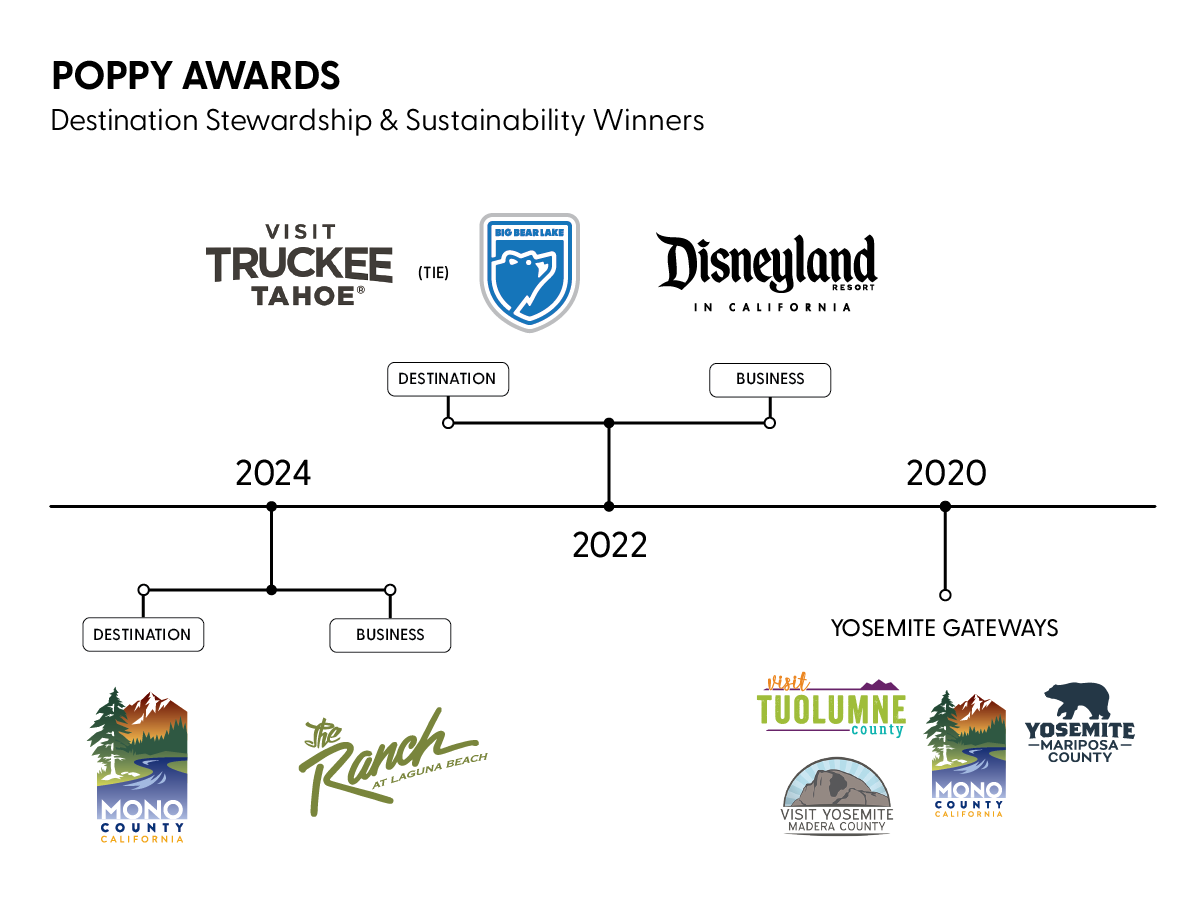For travel and tourism to effectively account for its current and future economic, social and environmental impacts, cooperative action must be taken from Destination Marketing/Management Organizations (DMOs), hospitality and travel businesses, and tourists. Many California DMOs, businesses and visitors have begun employing initiatives aimed at maximizing the positive impacts of tourism within a destination and minimizing the negative impacts to the greatest extent possible.
“Today, climate change represents one of the greatest global challenges of our time. Its impacts are extensive and are already felt at all levels: countries, businesses, and our own individual lives. They include extreme weather events, coastal erosion, biodiversity loss, destruction of infrastructure and property, disruption to cultural and natural heritage, as well as increasing stress on basic natural resources, among others. Travel & Tourism both contributes to and is impacted by climate change. The sector, therefore, has a responsibility to be part of the change that is needed to mitigate impacts and adapt to the threats posed by climate change.”
California leads the way
California is a pioneering force in sustainability and climate action. The state’s longstanding environmental ideals, paired with economic might as the fourth largest economy in the world, has uniquely positioned California as a global leader in the fight for an environmentally responsible, socially fair and economically viable future. It should come as little surprise that California tourism aligns with the resolute environmental ethic of California as a whole.
Several destinations, including Oceanside, Greater Palm Springs, Monterey County and Big Bear Lake, emphasize to visitors opportunities for sourcing environmentally responsible lodgings, eateries and experiences; offer tips for minimizing impacts from travel; and promote volunteer experiences for visitors to give back during their stay. Other destinations, like Sonoma County, offer tools and resources to local hospitality businesses to improve the sustainability of their operations.
Visit California has a partnership with Kind Traveler, the first “give and get” hotel booking platform, to incentivize travelers to enrich the destinations they visit. Kind Traveler’s Every Stay Gives Back (ESGB) program has generated over $200,000 from guest stays to benefit local charities.
A countless number of hospitality businesses in California are certified under the California Green Business Network. The network, which is operated by counties and cities throughout California, carry out desktop audits and in-person inspections of participating businesses to verify compliance with its green business standards – which include water and energy conservation, waste reduction measures and the prohibition of harmful chemicals, among other requirements.
The global travel and tourism industry recognizes the critical importance of the UN Sustainable Development Goals and has created international organizations to provide expert guidance towards these aims. One of the most influential and respected of these organizations is the Global Sustainable Tourism Council (GSTC), which manages global standards for sustainable travel and tourism (known as the GSTC-Standards), and acts as the international accreditation body for sustainable tourism certification.
Destinations in California including Sonoma County, Los Angeles and Oceanside have undergone comprehensive assessments from the GSTC to measure and evaluate compliance within the GSTC-destination standard. These assessments provide valuable guidance to advance sustainability within their destinations.
In addition to assessing destinations, the GSTC offers accreditation to qualifying certification bodies. These accredited bodies, like EarthCheck and Green Destinations, provide sustainability certification to destinations that meet its rigorous standards. Businesses employ these certifying bodies as well to improve the sustainability of their operations and show customers their commitment to being good stewards of the earth. Taj Campton Place in San Francisco, Alila Marea Beach Resort in Encinitas, El Encanto, A Belmond Hotel in Santa Barbara, Ventana Big Sur and Alila Napa Valley have all achieved certification under EarthCheck.
In June 2025, after over two years of development, Visit California released 12 Regional Strategic Tourism Plans, a sustainability guidebook, 12 regional scorecards (measuring California’s standing in sustainability and resiliency) and an interactive California Tourism Resilience and Sustainability Dashboard. The plans and resources are designed to help tourism businesses, residents and community stakeholders prepare for the future, support destination sustainability objectives and maintain tourism as a vital component of the California economy.
You can learn more and access the plans, scorecards and other resources at travelmattersca.com/regional-plans.
Since 2020, Visit California has recognized DMOs and businesses that excel in destination stewardship and sustainability at its biennial Poppy Awards. The “Destination Stewardship and Sustainability” award exists not only to celebrate excellence, but to inspire other destinations and businesses in California to incorporate these best practices into their operations.

Resources to learn more
For further research, visit the following organizations:
